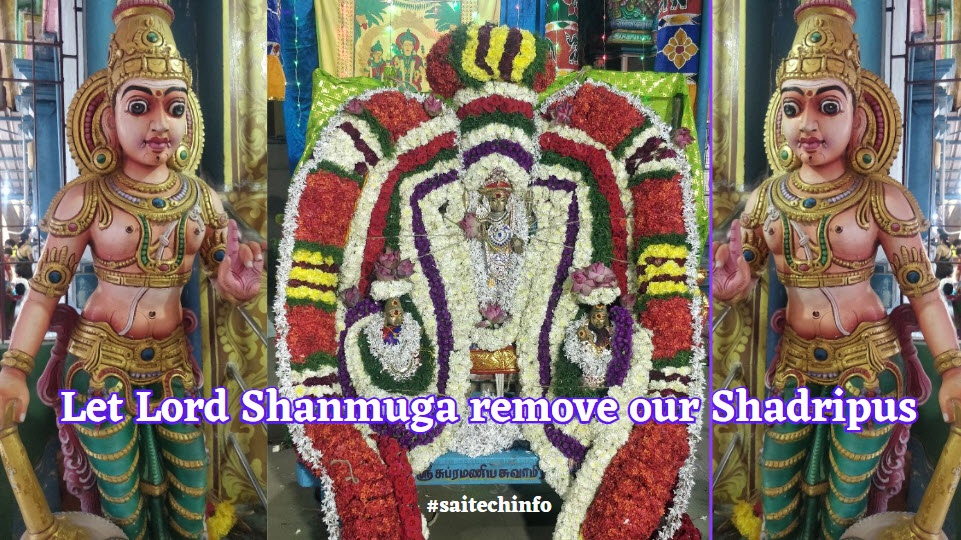
In Indian culture, there is a concept known as the “Shadripus” or the “Six Enemies,” which are considered obstacles on the path of spiritual and personal growth. These enemies are often discussed in the context of Hindu philosophy and are seen as inner weaknesses that a person must overcome to lead a righteous and fulfilling life. The Shadripus are:
- Kama (Desire): Unbridled or excessive desire for sensual pleasures can lead to attachment and distract an individual from their spiritual path.
- Krodha (Anger): Uncontrolled anger can cloud judgment, lead to destructive behavior, and hinder personal growth.
- Lobha (Greed): Excessive desire for material possessions or wealth can lead to unethical behavior and prevent one from achieving inner peace.
- Moha (Attachment): Excessive attachment to people, possessions, or situations can lead to suffering, as attachment often involves a fear of loss.
- Mada (Pride): Excessive pride or arrogance can blind individuals to their own shortcomings and prevent them from learning and growing.
- Matsarya (Jealousy): Envy or jealousy towards others can create negativity and hinder one’s own progress.
These enemies are often mentioned in the context of cultivating virtues such as self-discipline, self-control, and detachment to overcome the challenges they pose.
இந்திய கலாச்சாரத்தில், “ஷத்ரிபு” அல்லது “ஆறு எதிரிகள்” என்று அழைக்கப்படும் ஒரு கருத்து உள்ளது, இது ஆன்மீக மற்றும் தனிப்பட்ட வளர்ச்சியின் பாதையில் தடையாக கருதப்படுகிறது. இந்த எதிரிகள் பெரும்பாலும் இந்து தத்துவத்தின் பின்னணியில் விவாதிக்கப்படுகின்றன மற்றும் ஒரு நபர் நேர்மையான மற்றும் நிறைவான வாழ்க்கையை நடத்துவதற்கு கடக்க வேண்டிய உள் பலவீனங்களாகக் கருதப்படுகின்றன. ஷத்ரிபுகள்:
- காமா (ஆசை): சிற்றின்ப இன்பங்களுக்கான கட்டுக்கடங்காத அல்லது அதிகப்படியான ஆசை, ஒரு தனிநபரை அவர்களின் ஆன்மீகப் பாதையில் இருந்து திசைதிருப்ப வழிவகுக்கும்.
- க்ரோதா (கோபம்): கட்டுப்பாடற்ற கோபம் தீர்ப்பை மழுங்கடிக்கும், அழிவுகரமான நடத்தைக்கு வழிவகுக்கும் மற்றும் தனிப்பட்ட வளர்ச்சியைத் தடுக்கும்.
- லோபா (பேராசை): பொருள் உடைமைகள் அல்லது செல்வத்தின் மீது அதிகப்படியான ஆசை நெறிமுறையற்ற நடத்தைக்கு வழிவகுக்கும் மற்றும் உள் அமைதியை அடைவதைத் தடுக்கும்.
- மோஹா (இணைப்பு): மக்கள், உடைமைகள் அல்லது சூழ்நிலைகள் மீது அதிகப்படியான பற்றுதல் துன்பத்திற்கு வழிவகுக்கும், ஏனெனில் இணைப்பு பெரும்பாலும் இழப்பு பயத்தை உள்ளடக்கியது.
- மட (பெருமை): அளவுக்கதிகமான பெருமை அல்லது ஆணவம் தனிமனிதர்களை அவர்களின் சொந்தக் குறைபாடுகளுக்குக் குருடாக்கி, கற்றல் மற்றும் வளரவிடாமல் தடுக்கும்.
- மத்சார்யா (பொறாமை): மற்றவர்கள் மீது பொறாமை அல்லது பொறாமை எதிர்மறையை உருவாக்கி ஒருவரின் சொந்த முன்னேற்றத்தைத் தடுக்கலாம்.
இந்த எதிரிகள் பெரும்பாலும் அவர்கள் முன்வைக்கும் சவால்களை சமாளிக்க சுய ஒழுக்கம், சுய கட்டுப்பாடு மற்றும் பற்றின்மை போன்ற நற்பண்புகளை வளர்ப்பதன் பின்னணியில் குறிப்பிடப்படுகிறார்கள்.




